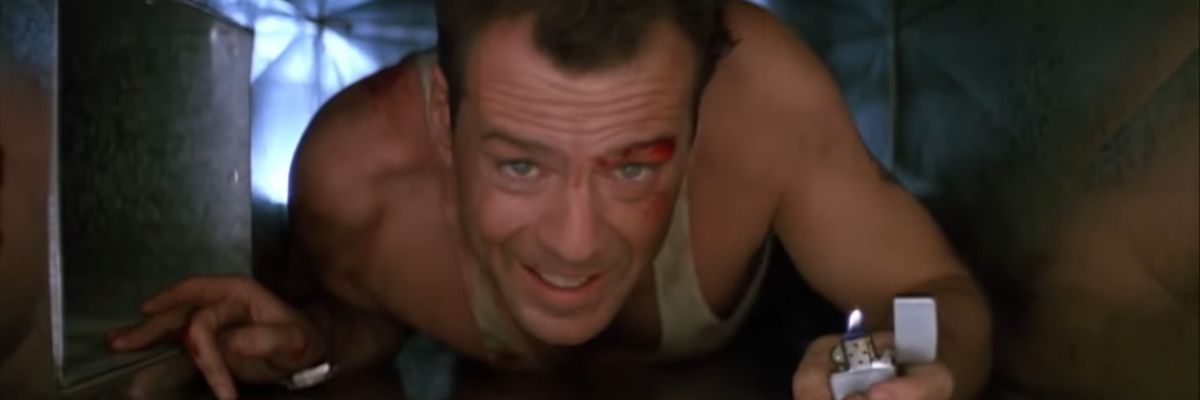
Note: As the author mentions, Die Hard is not for everyone. Even for a thirty-five-year-old movie, we feel obligated to issue a content warning to any who might be inclined to watch it.
A “story of how the rightful king has landed, you might say landed in disguise, and is calling us to take part in a great campaign of sabotage.” This is how C. S. Lewis, in Mere Christianity, admirably sums up the meaning of Christmas. On a level less profound, but nonetheless startling in its prediction of the future, he also describes the plot of Die Hard.
Does this description fit any other movies commonly considered “Christmas” movies? It seems not. To paraphrase Lewis again, the story of Christmas is one about a man invading the world to save it, at the invitation of the woman he loves. Die Hard is the only movie set during Christmas that tells a similar kind of story.
It is important to make a few distinctions here. There are bad movies that take place during Christmas. There are also good ones, such as It’s a Wonderful Life and certain adaptations of A Christmas Carol. These movies feature Christmas themes, such as conversion, awareness of the spiritual world, and charity. But they are not invasion stories, or if they are, they are invasions of Christ within particular souls. Christmas, meanwhile, is a story not only of personal conversion, but of the beginning of worldwide redemption. So perhaps they are partially Christmas movies, but not in the same way as Die Hard.
Consider the plot resemblances more closely: first, how a woman and a just man (Takagi) are involved in the advent of John McClane. Further, just as the just men of the Old Testament were important presages of the coming of Christ, they could go only so far. Takagi, while an admirable man, is not able to stop the evil. In fact, the evil stops him in his tracks.
There is, in the words of one great man, the scandalous particularity of the film: a public manifestation of salvation in one corner of the world—of all the places for a manifestation of goodness, in Los Angeles! And they used to say, “What good could come from Nazareth?”!
The people who are supposed to keep the law not only are inept, but actively impede the actions of John McClane. The main villain is only marginally less inept that then these men, and in love with his own cleverness. Furthermore, he tricks others into thinking he is willing to be reasonable, when he actually seeks to profit from utter destruction. There is also his obsession with learning the hero’s name. There is almost no better summary of the actions of Satan possible!
Just as God uses the weapons the devil thinks he is the best at using against him (the mystique of kingship, for example), so does John McClane use guns, explosives, and even computers.
Finally, the film captures the ambivalence of Christmas, from the devil’s point of view, as opposed to his horrified realization at Easter. The movie is not an Easter movie, because the devil realized at Easter that he was up against not only a perfect man, but God. However, at Christmas, the devil was not sure who exactly Jesus was—just that a man had come into the picture who was interfering with his plans in a big way. This is exactly the perspective of the villains in Die Hard.
With all of this said, it must be admitted that although Die Hard is the only Christmas movie, it is imperfect, perhaps even terminally so. It may be the only Christmas movie, and at the same time a Christmas movie one should not watch, for at least three reasons:
1) Frequent use of God’s name in vain. Is even a dramatic enactment of this sin a violation of the Second Commandment? How about a hundred?
2) Impure images. Although these are fleeting in and incidental to the movie, and although sins against purity are not nearly the most hateful sins, impure images easily enrapture and capture the imagination even when they are fleeting and incidental. And according to the seers of Fatima, they are the number one “gateway drug” to hell.
3) Finally, there is the waste of Bruce Willis’s potential for comedy, sometimes because his character is too busy profaning God’s name.
Nevertheless, whether something is good or bad does not change what it is. A Charlie Brown Christmas may have much more moral goodness, but this goodness does not make it a Christmas movie any more than moral goodness makes Ride the High Country a Christmas movie. Die Hard may be a Christmas movie that is morally at odds with itself, but it is still the only Christmas movie.
This brings us to an important point: with all its virtues, even the vices of the movie Die Hard also prompt valuable considerations. What does it say about film as a medium that after more than 100 years, it has produced only one real Christmas movie, and one that might not even be good to watch?
A few considerations to close: First, encouragement to read with the family over Christmas. As many have noted, one of the virtues of literature versus film is the action required of the reader versus the viewer. And so there is a sense in which a movie that fails at being a Christmas movie can be based on a book that succeeds in being a Christmas book. Take A Christmas Carol; when we watch the best versions, it is a more or less passive look at Scrooge’s interior response, reception of, and rejoicing in Christmas. When we read it, however, we subject ourselves with Scrooge to the invasion of the love that is Jesus Christ.
Second, we have to take care with our movie-watching habits, our frequency, and what kinds of movies we watch. Even movies that are very good in many ways fail notably in others.
Third, of course the good movies that are not Christmas movies but happen to take place during Christmas are still things we can and maybe should enjoy on occasion. They are part of the paraphernalia like skating and chestnuts roasting over the open fire. Grace builds on nature, and a Christian culture builds on a varied fare of good merriment, good stories, and good food.
Fourth, the call to action. It is time for someone to make a thoroughly good, wholesome movie that is also and in actuality A Christmas Movie.



